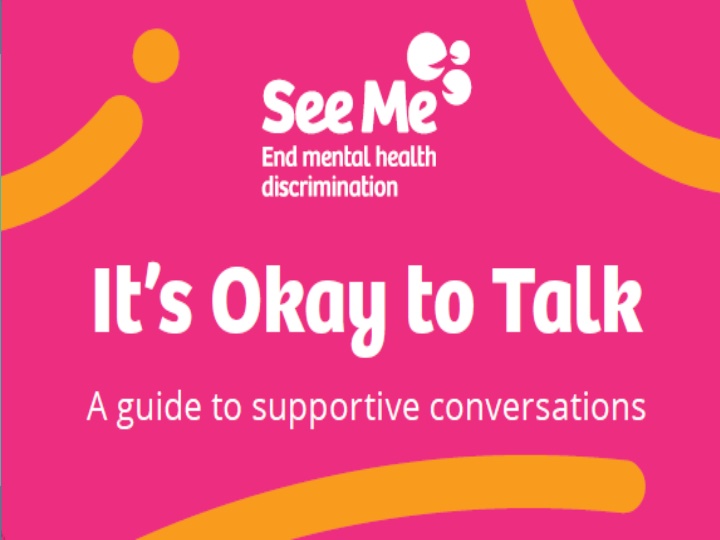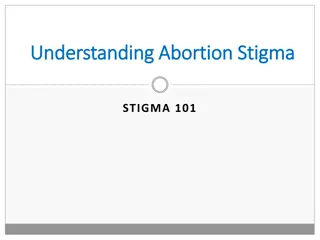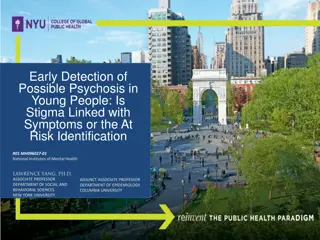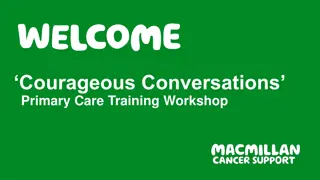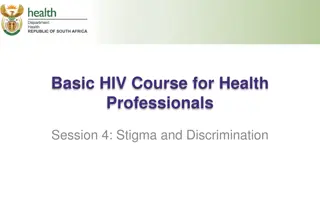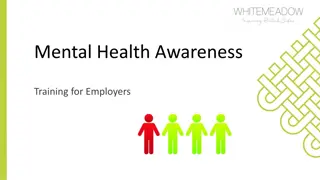Supportive Conversations Workshop: Understanding Mental Health Stigma
Explore the concepts of mental health stigma and discrimination in a workshop setting. Gain awareness of the impact of stigma, feel more confident in discussing mental health, and create a safer space for open dialogue. Learn to challenge stigma and discrimination, and hear personal experiences that shed light on the importance of addressing these issues.
Download Presentation

Please find below an Image/Link to download the presentation.
The content on the website is provided AS IS for your information and personal use only. It may not be sold, licensed, or shared on other websites without obtaining consent from the author.If you encounter any issues during the download, it is possible that the publisher has removed the file from their server.
You are allowed to download the files provided on this website for personal or commercial use, subject to the condition that they are used lawfully. All files are the property of their respective owners.
The content on the website is provided AS IS for your information and personal use only. It may not be sold, licensed, or shared on other websites without obtaining consent from the author.
E N D
Presentation Transcript
Its Okay to Talk How to have supportive conversations workshop
Session Objectives Introduce the concepts of mental health stigma and discrimination and build the understanding of what stigma and discrimination is. Develop a greater awareness of the impact of mental health stigma and discrimination. Feel more confident to have a conversation about mental health whether your own or with someone else.
Safer space agreement Listen to each other. Only share information you are comfortable sharing. Respect other people s limits and boundaries of confidentiality. Ideas are for sharing, personal stories are for honouring. Think about the impact of our words, assumptions and actions upon others. Respect the cultural and religious beliefs of others within the group. If you need to take time out, a range of support within the session available to you.
Who, what & why Who are you? What do you do? (Student? staff member/ society member.) Why are you here today?
Stigma & Discrimination How would you define mental health stigma? Stigma around mental health is about the negative attitudes or beliefs based on a preconception, misunderstanding or fear of someone with a mental health problem.
Stigma & Discrimination How would you define mental health discrimination? Discrimination is when a person performs an action, whether intentional or unintentional, that creates barriers and inequality for people with lived experience of mental health problems.
No idea why anyone would believe that Amber Heard when shes got loads of personality disorders. Public stigma I don t want to be a burden, not sure anyone would think I had a real problem anyway so I d better just keep quiet. Self-Stigma I attempted to get life insurance and it was just after I had been diagnosed with complex PTSD and I was refused life insurance, no one would insure me. Structural stigma They said I was unreliable because I had to care for my brother who is unwell at the minute. Stigma by Association
Other ways people may talk about feeling stigmatised Inferior Embarrassed Belittled Ashamed Hopeless Isolated Rejected Lonely Shunned Scared Anxious Dismissed Ridiculed Labelled/stereotyped Persecuted/Oppressed
On a scale of 1-5, how confident are you having a conversation about someone else s mental health?
On a scale of 1-5, how confident are you having a conversation about your mental health with someone
Scenario 1: Youve been at work and a colleague approaches you and asks if they can talk. They tell you they ve been struggling recently. You have also been having a difficult time of late and have another meeting that day that you are worried about getting to on time.
Scenario 2: You re at a friend s birthday party and another friend starts chatting to you about how they ve been struggling with their mental health of late. It is very noisy and there are a lot of other people around you.
Scenario 3: You are in the club house after training on a Thursday waiting for the meal to arrive. It is noisy and a lot of people are chatting at once. The team aren t in great spirits after losing a game at the weekend and some seemed visibly frustrated during the training session. Everyone is hungry and waiting for food to arrive.
Scenario 4: You are waiting at a bus stop when a friend arrives to catch the same bus. They seem tearful and upset and ask if you have time to talk. You are on your way to an appointment in town that you feel anxious about.
Scenario 5: Your teenage daughter has been very quiet and withdrawn recently. One morning before school she asks if she can talk to you about how she is feeling. You are trying to get your other child ready for school and make breakfast for the family.
Things to think about: Time Consider whether or not you are both able to have this conversation now. Give the other person the space to consider whether they can. What if it s not a good time? You might not feel you are currently in the right headspace to talk to someone about how they are doing. Let them know you care but are unable to chat at the moment. You could identify a better time to chat. You could also help them to think of someone else they could talk to if you feel up to it.
Things to think about: Place For some it can be useful to find a quiet space with no distractions. Others might find it easier to talk while also doing some sort of activity like going for a walk or doing something creative. What s needed? Someone may need space to offload or vent; it could be that they are seeking some support. Whatever they need, it s important that neither of you feels pressure to fix it or to have all the answers.
How to begin Ways to ask if someone is okay: How are you doing? How have you been feeling? I m here if you want to chat. How s everything going? Ways to let someone know you need to talk: I m not doing too well. I need to talk. It s not easy to talk about it. I trust you. Do you have some time to chat?
Listening and responding What do you think can help?
Listening and responding You don t need to be an expert. You don t need to fix things. It s okay to have silence. Be considered when sharing your own experience. Reflect back what you are hearing can show you care. Listen without interruption. Try not to minimise.
Listening and responding practice In small groups discuss the provided scenarios and consider: How you use your body language. How to encourage the other person while they are speaking. What an appropriate response feels like. What you might say.
How are you both now? What would be helpful? Asking them what they might need or find helpful next is a good question to ask. You don t need to have this information already you can look for this together. What do you do next time you see them? It might help the other person to know that the door is open to speak another time. If urgent help is needed You may become concerned about the other person s wellbeing. This could include finding out if the have made a plan to take their own life. Asking someone about suicide won t encourage someone to do it. If you feel that someone is at immediate risk, call 999. The next time you see them, they may not want to talk about their mental health be led by them. Reflecting You can both take some time to check in with yourself after the conversation.
Support & Signposting Breathing Space: www.breathingspace.scot Samaritans: Phone 116 123 or self help app https://selfhelp.samaritans.org/ Black Minds Matter www.blackmindsmatteruk.com Saheliya www.saheliya.co.uk Shakti Women s Aid shaktiedinburgh.co.uk LGBT Health & Wellbeing www.lgbthealth.org.uk
Support & Signposting Further Info and Resources: See Me Website: www.seemescotland.org SAMH Website: www.samh.org.uk NHS 24: www.nhs24.scot SAMH Time for You Online mental health support www.samh.org.uk/about-us/our-work/time-for-you
On a scale of 1-5, how confident are you having a conversation about someone else s mental health?
On a scale of 1-5, how confident are you having a conversation about your mental health with someone
